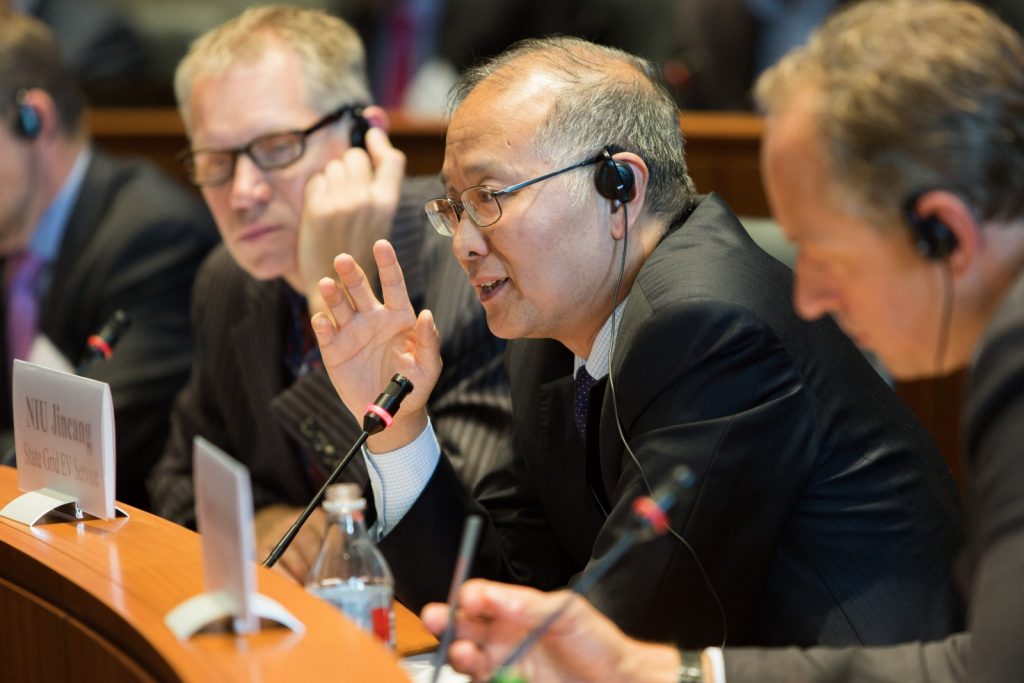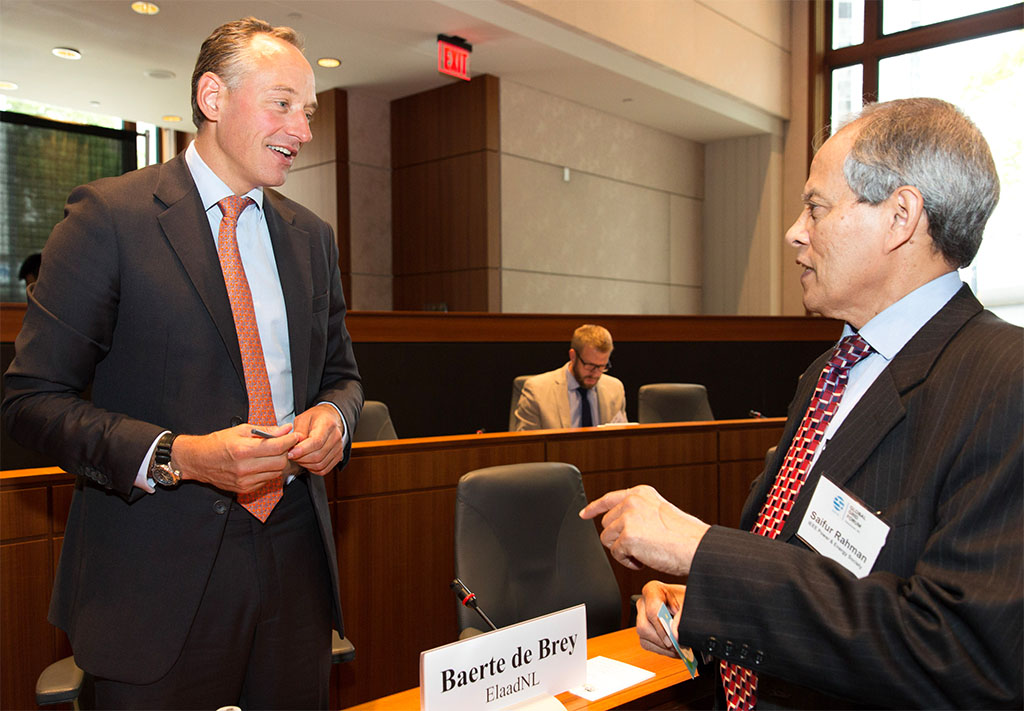
Renewable Cities convened experts from world leading e-mobility players to share insights on accelerating EV charging infrastructure roll out. Pictured: Alex Boston (SFU Renewable Cities), Niu Jincang (China State Grid EV Service), and Baerte de Brey (ElaadNL, the Dutch e-mobility knowledge and innovation centre). Photo Credit: Edison Electric Institute. Photo Credit: Edison Electric Institute.
GLOBAL GRID FORUM 2019 – TRANSPORTATION ELECTRIFICATION SESSIONS
Renewable Cities partnered with Edison Electric Institute and the Dutch Consulate to bring some of the world’s most advanced jurisdictions in transportation electrification to the Global Grid Forum 2019 in Vancouver, BC to share their insights for rapidly rolling out charging infrastructure. Alex Boston, Executive Director of Renewable Cities, moderated a series of events with this international gathering of utilities, as well as key decision makers across the public and private sector in BC. BC has joined a small cadre of jurisdictions with bold transportation electrification commitments, earnest initial steps down this path and a genuine interest in learning from the trailblazers.
Baerte de Brey shared his insights from the Netherlands, home to the world’s densest EV charging network and EU’s greatest penetration of electric buses. De Brey is the Chief International Officer with ElaadNL, the e-mobility knowledge and innovation centre for Dutch utilities.
Niu Jincang and Yuan Ren spoke to China’s leadership from the helm of China State Grid, which powers the world’s largest charging network and the world’s largest fleet of light duty EVs and battery electric buses. Jincang is Vice President, State Grid EV Service and Ren is the Executive Director of State Grid’s US Office.
E-MOBILITY POLICY & GOVERNANCE INSIGHTS
Key policy insights that emerged in these sessions:
- Clear Targets & Timetables: The Netherlands, for instance, has set ambitious targets for all transit buses and new passenger vehicles to be zero emission by 2030. In addition, sub-sectoral targets and interim timelines permit a cost effective and manageable market transformation process.
- Smart Policy Geographies: China spoke to the diverse policy and regulatory regimes across unique geographies that have enabled rapid, cost effective build-out of an extensive charging network. Medium and high-density commercial zones permit an increment above the standard electricity rates for providing high-speed charging services, making it profitable for many private sector charge point providers to capitalize the investment and project a payback. Highways, in contrast, require extremely high-speed, high-voltage, high-cost chargers that are used far less frequently. The regulator has permitted these chargers to be installed by the utility itself and to distribute the cost across the entire rate base. State Grid underscored that the most important charging locations are residential and offer an effective arrangement with EV manufacturers and dealers with distinct policy regimes—one for EV ready new buildings and another for retrofitting existing buildings.
- Mass Deployment: With compelling business cases for diverse geographies, China and the Netherlands are both rolling out waves of EV chargers, thousands at a time. These economies of scale enable dramatically lower cost per unit of deployment relative to the piecemeal approach in many jurisdictions. The Dutch national government, notably, is no longer subsidizing EV chargers, and most public EV chargers are being deployed with a profitable business model by the private sector.
- Commons Standards & Interoperability: To permit seamless interoperability for vehicles and charge points from diverse manufactures, common and open standards are necessary. While the Chinese and Dutch may differ on how broadly such standards should be shared, both have established common and open standards for diverse vehicle types, including buses, across their jurisdictions. The Netherlands is a small jurisdiction that is not, notably, manufacturing vehicles, so they have an independent interest in an open and common standard to facilitate rapid market transformation. ElaadNL regularly solicits input and updates the Open Charge Point Protocol. With tens of thousands of charge point installations across a score of countries, OCPP has become the de facto open standard.
- Strong Multi-Level Stakeholder Processes: While expressed differently in communist China and the western, liberal, democratic Netherlands, both jurisdictions had multi-stakeholder processes to enable diverse public and private sector stakeholders and levels of government—national to local–to engage in the implementation of mass charging station network roll out. Holland E-Mobility brings together the Dutch federal government, provincial and local governments, transit authorities, nongovernmental organizations, knowledge institutions, charge point companies, the automotive industry and utilities within different working groups. They help problem-solve, coordinate, and align efforts on technical issues, policies, regulations, standards, and procurement across the complex transportation electrification ecosystem.
